|
|
|
Sort Order |
|
|
|
Items / Page
|
|
|
|
|
|
|
| Srl | Item |
| 1 |
ID:
181823
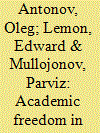

|
|
|
|
|
| Summary/Abstract |
While there have been a number of studies of the political economy of knowledge production in Central Asia, the often exploitative relations between foreign and local researcher, there has been less discussion of what Elizabeth Perry recently described as the ‘scholar–state’ nexus: how authoritarian rule rests on the suppression of independent academics, the ‘educated acquiescence’ of academia or their incorporation into the ‘factory of answers’. Through the concepts of suppression, acquiescence and incorporation, this article examines how restrictions on academic freedom have an impact on knowledge production in Tajikistan.
|
|
|
|
|
|
|
|
|
|
|
|
|
|
|
|
| 2 |
ID:
132057
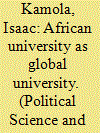

|
|
|
| 3 |
ID:
124649
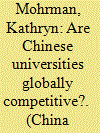

|
|
|
|
|
| Publication |
2013.
|
| Summary/Abstract |
This article compares five leading Chinese universities with 16 other research-intensive institutions in Asia, Europe and the United States. All the universities demonstrate an increasing commitment to research, although the fastest growth between 2003 and 2007 occurred in Asian institutions. Beijing and Qinghua universities compare favourably in terms of funding, but their research output is not as highly regarded. Despite concerns about academic freedom, the international standing of at least some Chinese universities is likely to rise in the future.
|
|
|
|
|
|
|
|
|
|
|
|
|
|
|
|
| 4 |
ID:
119941


|
|
|
| 5 |
ID:
145518
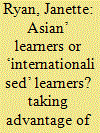

|
|
|
|
|
| Summary/Abstract |
The contemporary context of higher education around the world is characterised by increasing international ‘contacts’ between higher education systems. These include increased ‘flows’ of international students, as well as rapidly growing numbers of academic collaborations through international research partnerships and transnational teaching programmes. Yet, much of the literature on international students tends to focus on how international students, and Chinese students in particular, may lack particular Western academic knowledge and values. Identifying groups as, for example, ‘Asian’, ‘Chinese’ or ‘Confucian culture heritage’ learners runs the risk of stereotyped views of international students and the desirability (for all students) of attaining only ‘Western’ academic knowledge and skills. The rise in the internationalisation of universities around the world has seen not just an increase in international student numbers, but changes to the ‘four Ps’ of higher education: policies, programmes, pedagogy and partnerships. Interestingly, the direction of student flows is beginning to change from mainly ‘east’ to ‘west’, and there is a growing interest in how these interactions can lead to more globalised and intercultural learning outcomes not only just for international students, but also for local students and staff. This article draws on theories of transculturalism, contact theory and the core principles of the UK Higher Education Academy’s Internationalising Higher Education Framework. In the context of the proliferation of universities’ internationalisation policies and the increasing cultural diversity of university staff and student populations, these theories and principles can provide a foundation for examining how increased contact between Western and Asian higher education systems can lead to learning and knowledge outcomes that can better serve individuals and organisations in the current ‘global era’. It reports research that illustrates how academics’ notions of ‘scholarship’ and ‘learning’ in both contexts are either shared or differ and points to how the common academic values can be the basis for mutual understanding, and the differences can be the source of mutual learning.
|
|
|
|
|
|
|
|
|
|
|
|
|
|
|
|
| 6 |
ID:
165774
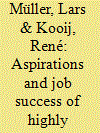

|
|
|
|
|
| Summary/Abstract |
This study pioneers the quantitative research of second generation Iranian graduates in Germany. Second generation immigrants in Germany, immigrants raised in Germany with at least one parent born abroad, are relevant as they are a crucial part of German society. Second generation immigrants in general as well as Iranians in particular are assumed to have high extrinsic aspirations. But a dataset big enough to study the employment situation of second generation Iranian graduates in Germany did not exist. Therefore, the article uses the KOAB dataset from 2011 to 2015, which contains data from 53,429 full-time employed higher education graduates in Germany (among those are 161 second generation Iranians). Their extrinsic job aspirations and career success (income, job satisfaction) are analyzed. Multivariate analyses reveal the higher extrinsic job aspirations of second generation Iranian graduates compared to many other migrant groups and Germans but similar to second generation Turkish graduates. Nevertheless, the extrinsic job aspiration is relevant, though only one factor among others to predict career success.
|
|
|
|
|
|
|
|
|
|
|
|
|
|
|
|
| 7 |
ID:
134162
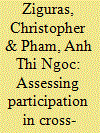

|
|
|
|
|
| Publication |
2014.
|
| Summary/Abstract |
One of the limitations of research on global educational mobility has been the primary classification of key participants - students and educational institutions - in national terms. This paper tests the challenges involved in such methodological nationalism by examining the provision of cross-border education in one city. As Vietnam's commercial centre, Ho Chi Minh City (HCMC) has experienced rapid transformation over the past two decades as the country has moved steadily from a state-directed to a more market-driven and globally integrated economy. Since the late 1990s there has been a parallel growth in cross-border higher education in HCMC, through the outbound mobility of students and the provision of foreign programmes by international partnerships and branch campuses. Drawing on available data supplemented with insights gleaned from interviews and existing literature, this paper develops a methodology for identifying and quantifying the key features of each form of domestic, overseas and transnational provision. We estimate that around 6% of HCMC's tertiary students are studying overseas and between 2% and 3% in foreign programmes delivered in the city. The rates of enrolment in overseas and transnational programmes by students in HCMC are thus far higher than for Vietnam as a whole, but still considerably lower than in those well-established cross-border education hubs, Hong Kong and Singapore. We argue that concerns about the growth of private education and inequalities in access may continue to limit the growth of transnational provision in HCMC.
|
|
|
|
|
|
|
|
|
|
|
|
|
|
|
|
| 8 |
ID:
143916
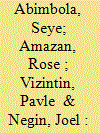

|
|
|
|
|
| Summary/Abstract |
International scholarships for higher education are a large component of foreign aid in many high-income countries, including Australia. The aims for Australian scholarships awarded to African students are to achieve development in Africa and advance the influence of Australia. However, well-articulated theories of change that define how scholarships are linked to these and other outcomes are not available in the literature. In order to address this gap, the authors explore the perspectives of Australian-funded Master's-level alumni from Kenya, Uganda and Mozambique on the implementation process before, during and after their scholarship award, and the outcomes of the scholarships. The authors found that Australian scholarships to Africans have the potential to spread Australian influence, and that returnee scholars, by virtue of their study in Australia, gain the capacity to become agents for development in their country. The process of choosing scholarship awardees, the local circumstances in each country on return, and support and mentoring networks after return can influence the achievement of these outcomes. Investments in international scholarships should be directed to develop additional skills and facilitate networks in order to further prepare the returnee scholars to influence development in their country and perpetuate Australian influence.
|
|
|
|
|
|
|
|
|
|
|
|
|
|
|
|
| 9 |
ID:
178389


|
|
|
|
|
| Summary/Abstract |
Globalisation presents the opportunity for universities to have a world-wide presence but newer institutions in developing countries have difficulty in embarking on such a journey. This paper presents a case study of an emerging university in East Africa and explores the challenges of high ambition while responding to globalisation. Interviews with senior administrators and academics showed that much time and effort was spent responding to funding issues and aid conditions, attaining international standards in research and teaching, and managing challenges of digital technologies against a background of limited infrastructure. In response to globalisation, we argue that emerging universities of this type should consider re-directing limited resources to focus on long-term projects for growing human capital through professional development while developing basic infrastructure needs.
|
|
|
|
|
|
|
|
|
|
|
|
|
|
|
|
| 10 |
ID:
105573
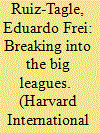

|
|
|
| 11 |
ID:
178238
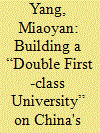

|
|
|
|
|
| Summary/Abstract |
Situated in the broader context of educational aid for Tibet and higher education reform in China, this article examines efforts to develop higher education in the Tibet Autonomous Region (TAR). Based on document analyses, observations and interviews, we interrogate the thoughts and actions of university officials in the TAR when responding to the state's call for the creation of “double first-class” (shuangyiliu 双一流) universities and disciplines. Our study identifies two main strategies adopted by university officials: capitalizing on the plateau's unique geography and China's system of preferential ethnic policies. University administrators hope to use the TAR's unique and strategic location as a springboard for curriculum and research development, while drawing on aid and assistance from the central government and partner universities. We conclude that the future of higher education in the TAR is highly dependent on external assistance and that the region faces an uphill battle in building a truly world-class university.
|
|
|
|
|
|
|
|
|
|
|
|
|
|
|
|
| 12 |
ID:
101945
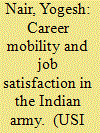

|
|
|
| 13 |
ID:
166089


|
|
|
|
|
| Summary/Abstract |
This article discusses the epistemological issues raised by the internationalisation of the social sciences as they affect the case of students from the People’s Republic of China who are trained in social sciences in France and return to pursue their career in higher education and research in China. The aim is to assess whether the epistemological differences between the two academic worlds may give rise to any professional difficulties in this many-sided scientific socialisation. Although our qualitative enquiry has revealed a number of differences, the problem of the availability of professional opportunities does not seem to have a distinctively epistemological dimension.
|
|
|
|
|
|
|
|
|
|
|
|
|
|
|
|
| 14 |
ID:
178225
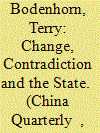

|
|
|
| 15 |
ID:
069834
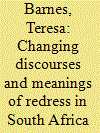

|
|
|
| 16 |
ID:
151585
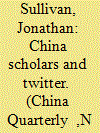

|
|
|
|
|
| Summary/Abstract |
Situating external engagement within the broader context of developments in Western higher education (HE) and technologies that are changing many aspects of academic life, this research note draws on the experiences of a large number of China scholars to assess the merits of Twitter for individual academics and the field as whole. Celebrating its tenth anniversary in March 2016, Twitter has shaken off its earlier image of celebrity stalking and inane ephemera and has become a tool used by many professionals working on China. Despite initial scepticism, many academics have recognized the utility of Twitter for various professional activities, including networking, increasing research visibility, gathering and disseminating information, and building a public profile. As external engagement activities become a routine expectation for academics in many Western universities, social media like Twitter have drawn attention as potentially useful tools. However, there are numerous obstacles to effective use, which this note addresses.
|
|
|
|
|
|
|
|
|
|
|
|
|
|
|
|
| 17 |
ID:
174327
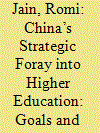

|
|
|
|
|
| Summary/Abstract |
As a double-edged sword, higher education has emerged for China as a fulcrum of its geo-intellect as well as a statecraft instrument. Geo-intellect connotes the expansion of a country’s frontiers of higher education and research in different geographies, which in China’s case is a subset of its global power project. As a form of statecraft, on the other hand, higher education is a channel for advancing national interests whether related to public diplomacy or specific geopolitical and geo-economic goals. South Asia is no exception to China’s outreach in the realm of higher education through which Beijing seeks to accomplish its statecraft mission. Against this background, this analysis delineates China’s explicit and implicit goals and interests in Nepal, a South Asian country, by employing the Educational Soft Power Model.
|
|
|
|
|
|
|
|
|
|
|
|
|
|
|
|
| 18 |
ID:
122991
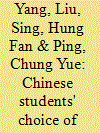

|
|
|
|
|
| Publication |
2013.
|
| Summary/Abstract |
Based on human capital theory, this article views the choice of major as an investment in human capital, and uses quantitative methods to analyse the choice of major of Mainland Chinese students when studying higher education abroad, and their affecting factors. The data used in this study, which sampled 12,961 Mainland Chinese senior secondary school students, are from a data set from a project subsidised by the Research Grant Committee of Hong Kong. Economic factors, such as expected economic return and expected employment prospects have significant effects on Chinese students' choice of major, after controlling factors relating to individual characteristics and family background. Furthermore, this article, using the case of China, provides feedback for the human capital theory and also proposes policy implications for developing and developed countries, and for international education institutions.
|
|
|
|
|
|
|
|
|
|
|
|
|
|
|
|
| 19 |
ID:
116558
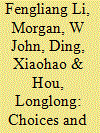

|
|
|
|
|
| Publication |
2012.
|
| Summary/Abstract |
Following the framework of Brinton and Kariya, and using a nationwide higher education graduates' survey (Graduate School of Education, Peking University in 2003), this article investigates the choices and the effects of institutional embeddedness for higher education graduates in China. Empirical results suggest that institutional embeddedness is more common in the context where employers seek higher-quality labour or where colleges pay attention to their graduates' future employment opportunities. Institutional embeddedness helps graduates find jobs, high-ranking positions and join large enterprises.
|
|
|
|
|
|
|
|
|
|
|
|
|
|
|
|
| 20 |
ID:
191111
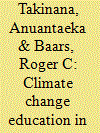

|
|
|
|
|
| Summary/Abstract |
Climate change education (CCE) can be an important tool to increase local community resilience. In 2017, the Pacific Community ratified the Framework for Resilient Development in the Pacific (FRDP) aiming to equip local communities with skills needed to become more climate change resilient. In 2018, Fiji implemented the Climate Change Resilience Programme (CCRP) at the University of the South Pacific (USP), the first of its kind in the South Pacific. This paper evaluates (i) the orientation and aim of the programme and (ii) how different stakeholders influenced the curriculum development process. Tribe's concept of curriculum space is used to highlight the overall aim of the CCRP. Freeman's stakeholder theory allows to identify key stakeholders and their influence on the curriculum. Results indicate that the programme seems to foster climate resilience in the workplace rather than the local community. Unfortunately, current and future community leaders, the notional targets of this course, were almost completely unrepresented in the process to accredit the course, with the body responsible for accreditation being dominated by industry representatives. This study helps to inform the current review of the Regional Certificate Programme to realign it with its initially envisioned community focus.
|
|
|
|
|
|
|
|
|
|
|
|
|
|
|
|
|
|
|
|
|